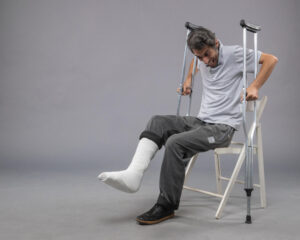
Understanding Fractures: Why Immediate Treatment Matters
Fractures, or broken bones, occur when a bone is subjected to more force than it can withstand. They can result from accidents, falls, sports injuries, or even overuse. Fracture Treatment is crucial because it ensures the bones heal correctly, which is vital for restoring normal function and preventing complications. Without proper treatment, a fracture can lead to chronic pain, deformity, and long-term disability.
What Happens If You Don’t Treat a Fracture?
Ignoring a fracture can have serious consequences. When a broken bone isn’t treated, it may not heal properly, leading to a condition known as malunion, where the bone heals in an abnormal position. This can cause persistent pain, reduced mobility, and even deformity. In severe cases, an untreated fracture may lead to nonunion, where the bone fails to heal altogether, leaving the individual with a permanent injury. Additionally, the surrounding muscles, nerves, and blood vessels can suffer damage, complicating the recovery process.
The Risks of Delaying Fracture Treatment
Delaying Fracture Treatment can exacerbate the injury. Swelling and bruising around the fracture site can increase, making it more difficult to reposition the bone later. Delayed treatment also raises the risk of infection, especially in open fractures where the bone pierces the skin. Furthermore, untreated fractures can lead to complications like blood clots, nerve damage, and post-traumatic arthritis, significantly impacting a person’s quality of life.
Dr. Dharmaraj Yadav’s Approach to Fracture Treatment
Dr. Dharmaraj Yadav, a leading specialist in fracture care, emphasizes the importance of timely Fracture Treatment. He believes that every fracture requires careful assessment to determine the best treatment—be it immobilization, surgery, or physical therapy. Early treatment not only enhances recovery but also prevents complications. Dr. Yadav recalls a case where a patient delayed treatment for a wrist fracture, leading to improper healing that required complex surgery to correct. This highlights the risks of postponing treatment and the importance of seeking professional care immediately.
For expert fracture care, visit Dr. Dharmaraj Yadav’s clinic, where he provides personalized, comprehensive treatment plans. Located at Nerul, Navi Mumbai, Dr. Yadav and his team are dedicated to ensuring the best outcomes for all patients. Don’t delay—schedule an appointment today for expert guidance and care.
Common Types of Fracture Treatments
There are several methods to treat fractures, depending on the severity and location of the break. Here’s a look at the most common Fracture Treatment options:
- Casting and Splinting: These are the most common treatments for fractures. A cast or splint immobilizes the broken bone, allowing it to heal in the correct position. This method is typically used for stable fractures where the bone ends are aligned.
- Surgical Intervention: In cases where the fracture is complex or involves joints, surgery may be necessary. This can include the use of metal plates, screws, or rods to stabilize the bone. Surgery ensures that the bones are aligned and held in place for proper healing.
- Traction: This method involves gently pulling on the bones to align them correctly. Traction is often used for fractures that affect long bones, such as the femur.
- Physical Therapy: After the initial healing phase, physical therapy is crucial for regaining strength and mobility. It helps prevent stiffness and restores function to the affected area.
Can Fractures Heal Without Treatment?
Some minor fractures, such as stress fractures or hairline fractures, may heal on their own if the bone is not subjected to further stress. However, even in these cases, it’s essential to consult a healthcare professional. Dr. Dharmaraj Yadav advises that proper diagnosis and guidance are critical to ensure that the fracture heals correctly and doesn’t lead to complications.
FAQs About Fracture Treatment
1. What are the first signs that I might have a fracture?
The most common signs of a fracture include severe pain, swelling, bruising, and an inability to move the affected area. If you suspect a fracture, it’s important to seek medical attention immediately.
2. How long does it take for a fracture to heal?
The healing time for a fracture depends on the type and severity of the break. Most fractures take 6 to 8 weeks to heal, but some may take longer. Your doctor will monitor your progress and may recommend physical therapy to aid recovery.
3. Is surgery always required for fractures?
No, surgery is not always necessary. It depends on the location and complexity of the fracture. Stable fractures often heal with immobilization, while more complex fractures may require surgical intervention.
4. Can I prevent fractures in the future?
While it’s impossible to prevent all fractures, you can reduce your risk by maintaining a healthy lifestyle. This includes a balanced diet rich in calcium and vitamin D, regular exercise to strengthen bones, and using protective gear during sports activities.
5. What should I do if I suspect a fracture?
If you suspect a fracture, it’s important to immobilize the affected area and seek medical attention immediately. Avoid putting weight on the injured area and apply ice to reduce swelling.
Final Thoughts: Don’t Ignore Fracture Treatment
Fracture Treatment is essential for ensuring that a broken bone heals properly and to avoid long-term complications. Delaying or avoiding treatment can lead to serious consequences, including chronic pain and permanent disability. Dr. Dharmaraj Yadav emphasizes the importance of timely and appropriate treatment to ensure the best possible outcome. If you suspect you have a fracture, don’t hesitate to seek professional medical advice.
